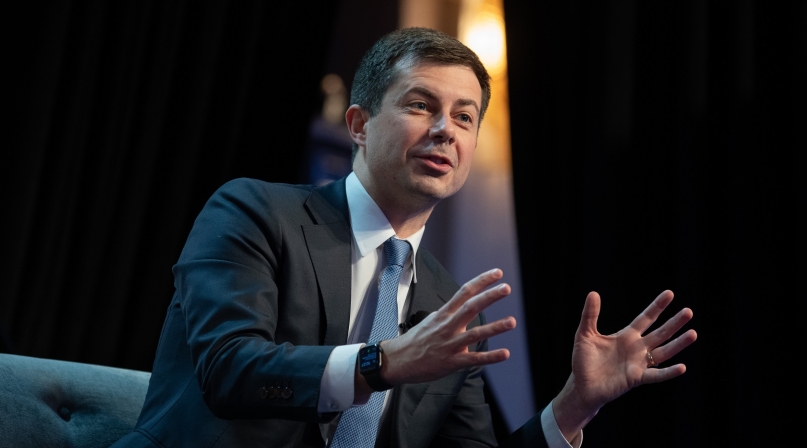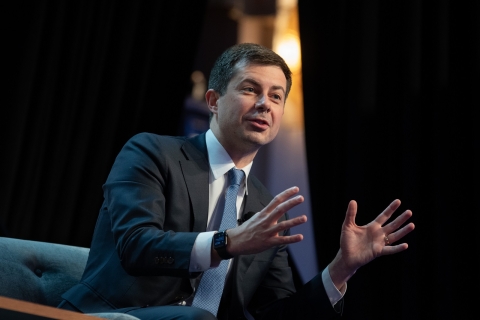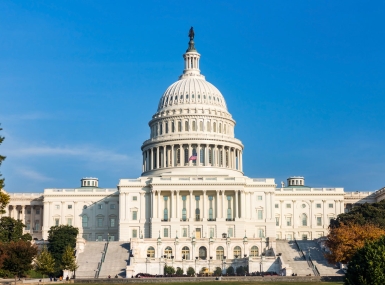Buttigieg: ‘We need to be on time, on task and on budget’ with infrastructure dollars

Key Takeaways
Transportation Sec. Pete Buttigieg told county officials Feb. 14 that everybody has a role to play when it comes to making use of the historic $1.3 trillion infrastructure bill President Biden signed into law in November.
“The great risk with any deployment of taxpayer dollars is the risk of not seeing $1.3 trillion of value delivered to the American people,” he said in a conversation with NACo President Larry Johnson, a DeKalb County commissioner at the General Session.
“So, what does it mean to actually make sure that happens?” Buttigieg asked. “Well, we’ve got to be on time, on task, on budget, with all of these programs.”
It will be “critically important” for counties to speak up about their infrastructure priorities, he said.
“Please make sure, when you see anybody from the Department of Transportation, to get to know them, because they are the connective tissue that are going to help you interface with us as a department,” he said.
Buttigieg noted his department’s role: “It’s going to be critically important for us to be user-friendly in helping you apply for those funds.” Johnson asked about strategies DOT plans to use to be user-friendly with counties.
“First of all, we’re just trying to make the process a little bit simpler,” Buttigieg said, adding that with implementation of the new infrastructure law, DOT is creating about 40 new programs. “And one of the things that we realize, of course, is that you don’t have the staff to navigate 40 different application processes for 40 different programs.”
Buttigieg said his department is going to try to have a common Notice of Funding Opportunity. “Basically, the equivalent of, you know, the Common Application for college applications.”
“The bottom line is, we need to have a better front door for local government trying to get things,” he said.
If a county is encountering a roadblock to accessing funding for infrastructure projects, “there are ways for local governments to come directly to the department, if there’s something that you don’t think is getting enough attention through the regular formula process,” Buttigieg said.
Johnson also asked how the Transportation Department can help rural counties, which oftentimes do not have the resources to access funding that’s available to them.
‘Yeah, so this is very important,” Buttigieg said. “And we’re doing it in two ways. Dedicated programming for rural communities. So, think of the Routes Program, for example, and definitely get to know that program, if you haven’t already.”
“We’re going to go out of our way to make sure that there are adequate levels of support that can’t just get gobbled up by the bigger pool,” he said.
Buttigieg put in a plug for rural counties to take a look at electric vehicles and electric vehicle infrastructure.
“Even though there is this kind of traditional cultural attitude about EVs, that we’re talking about luxury vehicles for zipping around cities, and they can be. But one of the biggest opportunities for EVs is rural, for the simple reason that rural drivers have longer drives,” he said.
“What a lot of people in rural America don’t realize is you already have charging infrastructure; it’s called the plug in your home. Right? If you have a single-family home, and you happen to have a garage, or a carport, you’ve got charging infrastructure right there at your house,” he said.
“I think as the pickups come on the market, and people see that they have superior towing and torque, and you can power your shop tools, then people are going to get more excited about it. I think just the commercials on the Super Bowl did more for this than I ever could. But I’m mentioning this because I want to make sure it’s understood how big of an opportunity it is.”
“I can’t wait to see what we’re going to be able to deliver working together,” he said. “So, thank you, in advance.”

Attachments
Related News

NACo and coalition partners sends letter opposing heavy truck weight and size limits to congressional leaders
On January 20, NACo and 20 coalition partners sent a letter to leaders of the U.S. House Committee on Transportation and Infrastructure, U.S. Senate Committee on Commerce, Science and Transportation and Senate Committee on Environmental and Public Works urging them to oppose any legislation that would increase maximum truck size and weight limits on federal highways—either on their own or as part of larger reauthorization legislation.

Federal district court issues ruling preventing the federal government from imposing immigration compliance mandates on grant recipients
On November 4, a federal judge in Rhode Island ruled that the U.S. Department of Transportation cannot condition federal grant funding on a recipient’s cooperation with federal immigration enforcement efforts.

U.S. House of Representatives passes SPEED Act and other permitting reform bills
On December 18, the U.S. House of Representatives passed the SPEED Act (H.R. 4776). The SPEED Act would strengthen county involvement in decision-making and make needed commonsense reforms to the federal environmental review process.
